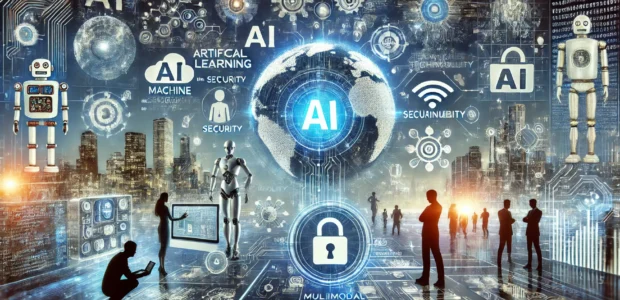
Artificial Intelligence (AI) has become more than a buzzword — it is the backbone of digital transformation in 2025. What was once a futuristic dream confined to sci-fi movies is now a very real part of our everyday lives. From smart assistants and personalized recommendations to autonomous vehicles and predictive healthcare, AI is reshaping industries, economies, and even the way we think.
In this blog, we’ll dive deep into what AI really means today, the top trends dominating the space in 2025, and where it’s all heading next.
What is Artificial Intelligence in Today’s Context?
Artificial Intelligence refers to the simulation of human intelligence by machines. It involves teaching machines to mimic cognitive functions such as learning, reasoning, problem-solving, perception, and language understanding.
In 2025, AI isn’t just about chatbots or voice assistants anymore. It has evolved into a vast ecosystem of technologies including:
- Machine Learning (ML) – Teaching machines from data
- Natural Language Processing (NLP) – Understanding human language
- Computer Vision – Interpreting visual information
- Robotics – Automating physical tasks
- Generative AI – Creating new content, like text, images, music, and even code
AI systems are no longer standalone tools — they’re integrated deeply into the infrastructure of businesses, governments, and homes.
Top AI Trends Dominating 2025
1. AI + Human Collaboration (Augmented Intelligence)
Rather than replacing humans, AI in 2025 is more focused on enhancing human abilities. The new term gaining traction is “augmented intelligence,” where AI helps professionals make better decisions.
Examples:
- Doctors using AI to detect anomalies in X-rays
- Lawyers leveraging AI to sort through massive legal databases
- Writers and marketers using AI tools for content ideation and editing
This human-AI partnership is increasing productivity and innovation across fields.
2. Generative AI Going Mainstream
With tools like OpenAI’s ChatGPT, Google’s Gemini, and Meta’s Llama pushing the envelope, generative AI has exploded in popularity. In 2025, generative AI powers:
- Content creation (blogs, videos, music)
- Design and prototyping
- Code generation and software development
- Synthetic media for marketing
Ethical concerns around deepfakes and misinformation still exist, but responsible frameworks are emerging to guide safe use.
3. Edge AI: Intelligence on the Device
Edge AI allows AI processing to happen directly on devices like smartphones, wearables, cameras, and industrial machines, instead of relying solely on cloud servers.
In 2025, this means:
- Faster response times
- Improved privacy (data doesn’t leave the device)
- Offline functionality
Apple, Samsung, and Google are embedding advanced AI into chips that make phones smarter and more context-aware without draining battery or needing an internet connection.
4. AI in Climate Tech and Sustainability
As climate concerns mount, AI is playing a key role in sustainability. In 2025, AI is helping:
- Predict and manage energy consumption
- Monitor deforestation and wildlife in real-time using satellite imagery
- Optimize agricultural yield with smart farming
- Detect pollution patterns in oceans and air
Green AI is also a movement that aims to reduce the carbon footprint of AI systems themselves, especially large language models.
5. AI Regulation and Ethics in Focus
2025 has seen major policy shifts in how AI is regulated. Governments and global bodies like the EU and UN are enforcing:
- Transparency in AI decision-making
- Accountability for AI-generated content
- Data privacy and security standards
- Ethical use of surveillance and facial recognition
Companies are now required to undergo AI audits to ensure systems are fair and non-discriminatory, especially in hiring, lending, and law enforcement.
The Impact of AI Across Industries
Healthcare
AI is revolutionizing diagnostics, drug discovery, and patient care. Wearable devices monitor vitals in real time, and AI algorithms can predict heart attacks or strokes before they happen. Personalized medicine is now more accessible, thanks to AI-powered genetic analysis.
Education
AI tutors, adaptive learning platforms, and AI-generated curriculum materials are transforming how students learn. Language learning apps now offer real-time pronunciation feedback using AI. Teachers also benefit from AI-based assessment tools.
Finance
AI detects fraud within milliseconds, automates trading, and personalizes financial advice. Robo-advisors are gaining popularity for investment strategies, and banks use AI for real-time credit scoring and customer support.
Retail
AI predicts customer behavior, personalizes shopping experiences, and manages inventory in real-time. Virtual fitting rooms powered by computer vision are the new normal for e-commerce.
Manufacturing
Smart factories use AI for predictive maintenance, quality control, and supply chain optimization. Robots work alongside humans in collaborative roles, known as “cobots.”
Challenges Ahead: The Dark Side of AI
Despite its promise, AI is not without risks. Key concerns in 2025 include:
- Bias in AI algorithms – Discrimination in hiring or legal decisions
- Job displacement – Especially in roles involving repetitive tasks
- Data privacy – With increased surveillance and data usage
- AI misuse – From misinformation to cyberattacks
- Over-reliance on machines – Eroding critical thinking skills
The challenge is to balance innovation with responsibility. That’s where ethical AI development and proper governance come into play.
The Future of AI: What’s Next?
Looking beyond 2025, here’s what we can expect:
- Artificial General Intelligence (AGI) – Systems that can perform any intellectual task a human can
- Quantum AI – Combining quantum computing with AI for exponential speed-ups
- Neuro-symbolic AI – Bridging logical reasoning and deep learning
- AI as Co-creators – In art, science, and innovation
Ultimately, the question is not whether AI will change the world — it’s how we choose to use it.
Final Thoughts
Artificial Intelligence in 2025 is no longer optional — it’s essential. It’s shaping how we work, live, communicate, and even think. With its rapid advancements come both opportunities and responsibilities. Whether you’re a business leader, developer, student, or consumer, understanding AI is crucial to navigating the future.
The most successful societies and individuals will be those who embrace AI thoughtfully, prioritize ethical usage, and continuously adapt in a world where change is the only constant.
